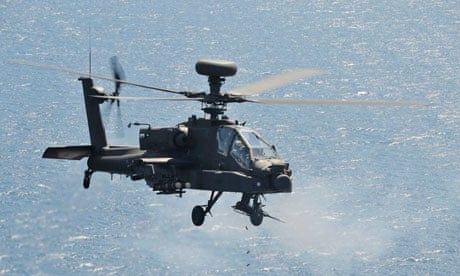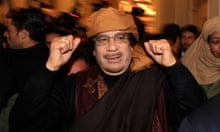Britain and France are to deploy attack helicopters against Libya in an attempt to break the military stalemate, particularly in the important coastal city of Misrata, security sources have told the Guardian.
In a significant escalation of the conflict, the Apaches – based on HMS Ocean – will join French helicopters in risky operations which reflect deepening frustration among British and French defence chiefs about their continuing inability to protect civilians in Libya.
Apaches, which are being used in counter-insurgency operations in Afghanistan, can manoeuvre and attack small targets in relatively built-up areas. Heavily armed Apaches and French Tiger helicopters are equipped with night vision equipment and electronic guidance systems. Forces loyal to the Libyan leader, Muammar Gaddafi, have shed their uniforms, are using civilian vehicles and hiding armour near civilian buildings, including hospitals and schools.
The decision to deploy the helicopters is a clear recognition that high-level bombing from 15,000 feet cannot protect civilians who continue to be attacked by rocket and mortar shells. It brings the Nato offensive much closer to the ground at a time when Britain and other Nato countries are insisting they have no intention of sending in troops.
However, the helicopters could be vulnerable to handheld rocket-propelled grenades and even rifle fire.
Hospital officials said two people were killed and several wounded during Monday's fighting in Misrata. Later, heavy explosions outside the city were heard, lasting about an hour.
Reuters quoted a rebel spokesman as saying that forces loyal to Gaddafi also shelled the rebel-held town of Zintan and moved troops close to the mountainous region bordering Tunisia, intensifying operations on the war's western front.
On Monday Nato warplanes bombed Tripoli in what appeared to be the heaviest night of bombing since the start of the air campaign against Gaddafi's forces and his sprawling compound. More than 20 airstrikes in less than half an hour set off thunderous booms that rattled windows around the city.
Britain and France clearly hope that the use of attack helicopters, and the fact of revealing the intention to use them, will deter pro-Gaddafi forces and assuage Libyan rebels who have been demanding more effective military action from Nato countries. The sight of Nato forces actually on the ground would be strongly opposed by most countries in the alliance, including the US and also those Arab countries in favour of the air campaign against Gaddafi's forces.
The foreign secretary, William Hague, attending an EU ministerial meeting in Brussels, said: "We are very much behind the intensification of the military campaign and ... so is France." He added: "We certainly agree with France, and indeed with all our partners, including all our partners at the EU meeting here today, that it is necessary to intensify the military, economic and diplomatic pressure on the Gaddafi regime."
Alain Juppé, France's foreign minister, confirmed that Paris has dispatched a dozen helicopters to add greater strike force to the campaign against Gaddafi in Libya. He said that the 12 Tiger and Gazelle helicopters sent from Toulon on 17 May would enable "us to better adapt our ground attack capacity with more precise means of striking".
He added: "Our strategy is to step up the military pressure in the weeks ahead while pushing at the same time for a political solution." According to French sources, the battleship Tonnerre, carrying the helicopters, left Toulon last week. The vessel combines the roles of helicopter carrier, hospital ship, and troops transporter.
Juppé said the helicopters would not be used to deploy ground forces in Libya and that the decision to send them was fully in line with the UN security council resolution mandating attacks in Libya.
The French newspaper Le Figaro said the helicopters would be assisted by target identification from French special forces who have been on the ground in Libya since the start of the allied operation there. The Ministry of Defence does not comment on special forces' operations.
Jim Murphy, the shadow defence secretary, said: "This is a significant development. It is right that the alliance is intensifying military pressure on Gaddafi's forces, but the British government needs to be clearer about a political strategy for Libya and whether the military commitment to Libya is an open-ended one."
The first international stabilisation response team has arrived in Libya, the international development secretary Andrew Mitchell has confirmed . He said Britain would continue to provide medical and emergency food supplies, adding that "the international community also needs to start thinking strategically about what is needed now to help lay the foundations for a stable, secure Libya".






Comments (…)
Sign in or create your Guardian account to join the discussion